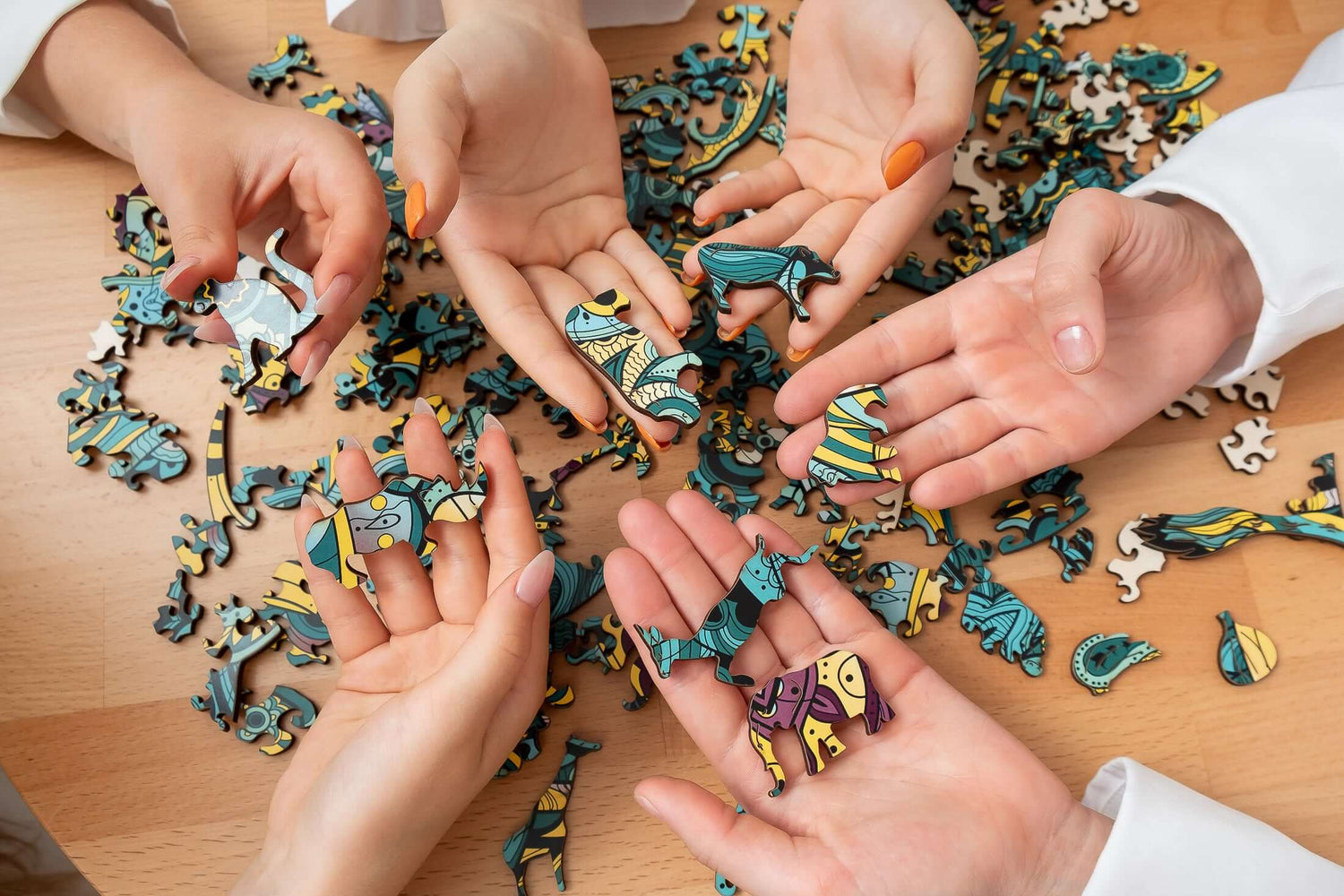
Puzzles- Best Way To Increase The IQ Level
Share
Puzzles are a great way to spend time by yourself or with your loved ones. Wooden brain teasers, thousand-piece jigsaws, and three-dimensional mechanical puzzles are just a few of the puzzle types that have been shown to boost cognitive function and memory retention. Indeed, puzzles are becoming more popular in the modern world.
Different puzzles have been around in some shape or another for a very long time. There is no limit to the number of puzzles that may be created. We can all agree that puzzles are great for kids since they help them learn to think critically and increase IQ level. Did you know, though, that solving puzzles has similar positive effects on the brains of adults?
Puzzles are fantastic for your intelligence, IQ, and problem-solving abilities in a number of ways:
-
Boost Your memory All-Around
Experts in the field of healthy living have theorized that working with a wooden jigsaw puzzle of any kind would be the best approach to improve your puzzle-solving skills.
What's more, they can't be used in the real world. However, research suggests that using your brain's left and right hemispheres together to solve problems might help you become more focused.
As you go through problems, you'll be able to fortify the synapses between your brain cells. It also causes people to wait longer before starting new relationships. This results in increased mental velocity as a consequence of more efficient thought processes.
Naturally, puzzles are excellent for enhancing working memory. We can see the overall picture and recall what colors and forms go together thanks to puzzles.
Recent studies have shown that these types of mental workouts help your brain maintain existing connections and establish new ones. There's no denying that solving puzzles may boost your IQ in several ways, including your ability to think critically, your ability to reason cognitively, and your level of productivity.
-
Doing puzzles may increase your intelligence
Many puzzles, from Rubik's Cubes and Itachi puzzles to mathematics and word problems may be used to improve one's intelligence. There are many who claim that the ability to solve difficulties and puzzles doesn't help one become smarter; rather, it only helps one become more successful at games.
Different puzzles test different skills, such as judgment, mental agility, arithmetic, or numerical reasoning, and observation. These skills are crucial in all aspects of our life, from our personal relationships to our careers.
You may sharpen your spatial and visual sense by practicing with challenging problems. One's visual and spatial imaging ability may be gauged by their capacity to recognize and remember relationships between objects and their surrounding environments.
This skill is essential in many fields, but it is especially important in medicine and engineering, where understanding spatial relationships among components is crucial. Puzzles are a great way to exercise your brain and develop this skill if you feel you are lacking.
Solving puzzles may help you develop better problem-solving, analytical, and critical-thinking skills. So, it may assist you act swiftly in tense situations or when you're under a lot of pressure. Your capacity for analysis and reflection improves as a consequence.
-
Improved Emotional State
Problem-solving stimulates dopamine release in the brain. This neurotransmitter regulates optimism and a sunny disposition. It has a negative impact on cognitive processes including learning, memory, concentration, and drive.
Dopamine is released when we do even the smallest of tasks successfully. The encouragement from this inspires us to keep going and improve.
-
Prevention of Alzheimer's Disease and Other Forms of Dementia
You may be able to delay the development of these diseases if you engage your mind in a variety of activities. Alzheimer's patients who keep their brains engaged by working puzzles and other difficulties have a reduced chance of having brain cells die off as a result of the condition. Additionally, it assists in the development of new nerve cells as well as the strengthening of connections between those that already exist.
According to the findings of the study, the amount of time a person has spent working on puzzles is inversely linked to the likelihood that they have Alzheimer's disease. Therefore, you should get started as soon as possible on adding puzzles into your everyday life. It is never too late to start protecting your brain's health, you should do it immediately.
-
Capacity to Analyze and Address Issues
Employers place a higher premium on candidates who have developed skills such as critical thinking and inventive problem solving. We can perfect all of these skills by playing with the best puzzles, which are often constructed of wood. We need to be able to think creatively and use our problem-solving talents in order to solve the riddle.
When a riddle is solved, the answers might be utilized as evidence to support or refute a hypothesis, in the creation of a theory, or in the acceptance of a fresh point of view. The acquisition of these skills may assist employees in striking a more favorable balance between their personal and professional life.
Conclusion
Putting together jigsaw puzzles is beneficial to your mental, bodily, and even spiritual well-being. It has been shown that working on jigsaw puzzles is beneficial for the health of the body, mind, and spirit.
Playing with puzzles, which may be enjoyed by individuals of all ages, has the added advantage of improving one's hand-eye coordination as well as the finger strength of the player.
